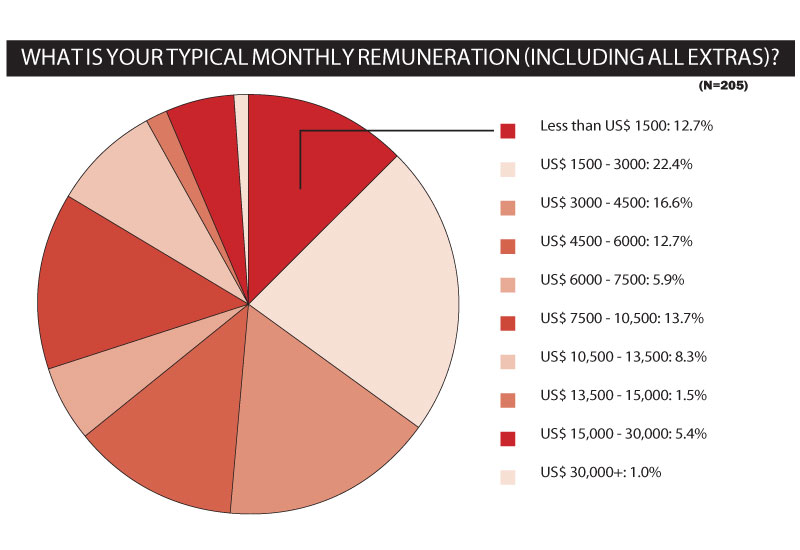SALES AND MARKETING IN FOCUS
Last year we put a spotlight on the GMs, but in 2010, sales and marketing gets deeper analysis.
More than 80% of the sales and marketing respondents were below 40 years old and 50.1% came from either Lebanon, the UAE or Western Europe.
Although 22.4% of all respondents registered an average monthly salary of $1500 to $3000, the figure was far higher for sales and marketing (43.8%). However, 31.3% of respondents said 0—5% of this remuneration was made up of commission and bonuses.
Interestingly, while 19.6% of all respondents said they were completely happy in their current job, only 7.7% of sales and marketing respondents could say the same.
Furthermore, while 33.2% of total respondents said they would leave their current job for a more prestigious position, a whopping 61.5% of sales and marketing respondents said they would jump ship for the same reason.
While 29.1% of all respondents expect a pay rise of more than 10% within the next year, 50% of sales and marketing respondents are looking forward to a significant rise in their remuneration.
One thing is clear, those in sales and marketing roles are more optimistic than the group as a whole.

Advertisement
HOW THE MONEY MAKES A DIFFERENCE
When you look at the difference financial rewards make in sentiment, the findings would suggestion a fairly strong link between amount of pay and job satisfaction.
No real surprise, but something employers should take note of, especially when you consider 19.6% of total respondents said they were totally happy in their current job and only 34.2% would leave their current job for a higher salary. However, when you focus on the respondents who earned less than $1500, a paltry 6.3% said they were completely happy, with 62.5% stating they would leave their current job for the higher salary.
While 46.9% of those who were in the lowest pay category actually felt they were totally loyal (posting a five out of five rating), 68.8% felt their company only showed a rating of three out of five or less for loyalty to them. This negative view was 10.4% higher than the total respondents figure.
For 70.2% of those earning $3000 or less, better training schemes were rated as extremely important or a deal breaker when considering a move to another company. High on the agenda was pay, with 86.4% claiming the wage was extremely important or a deal breaker.
These figures are in direct contrast when compared with those who earn $10,500 or above a month – only 22.6% rating training schemes as extremely important or a deal breaker. Only 68.8% put wages in the same categories of priority.
Considering the cost of training, a balance between pay and happiness is key when tackling remuneration.
WHAT HAVE WE LEARNED?
While raw data is not an answer in itself, trends can be observed.
The hospitality industry is more optimistic about the future than it was a year ago, when people were uncertain as to how the economic crisis would develop.
Yet this optimism is offset by a concern over job security. It is little wonder that people are more anxious, many having seen colleagues either made redundant or relocated.
However, normal sentiment appears to be returning. Roughly the same percentage of people expect promotions and pay rises as they did in 2009. Whether or not they get them remains to be seen.
Those who earn the least are looking for ways of improving their situation and have therefore placed a greater amount of importance on training, respect and remuneration.
Those who already earn a healthy monthly wage are not so concerned with training, although money still plays a part, but they are looking at the reputation of the company they would work for.
It will be interesting to see if 2010 proves to be the year many believe it will be. But, for now, we will leave you with our favourite comparison.
While 57.6% of respondents earning under $3000 would leave a job for a higher salary, only 12.5% of those earning more than $10,500 would do the same.
However, 40.6% of people earning $10,500 would leave for a more prestigious position, while only 22% of respondents earning under $3,000 would move for the same reason.
It would appear that once you have the money, you go on the search for prestige – happy hunting whichever you are chasing.









 Search our database of more than 2,700 industry companies
Search our database of more than 2,700 industry companies









